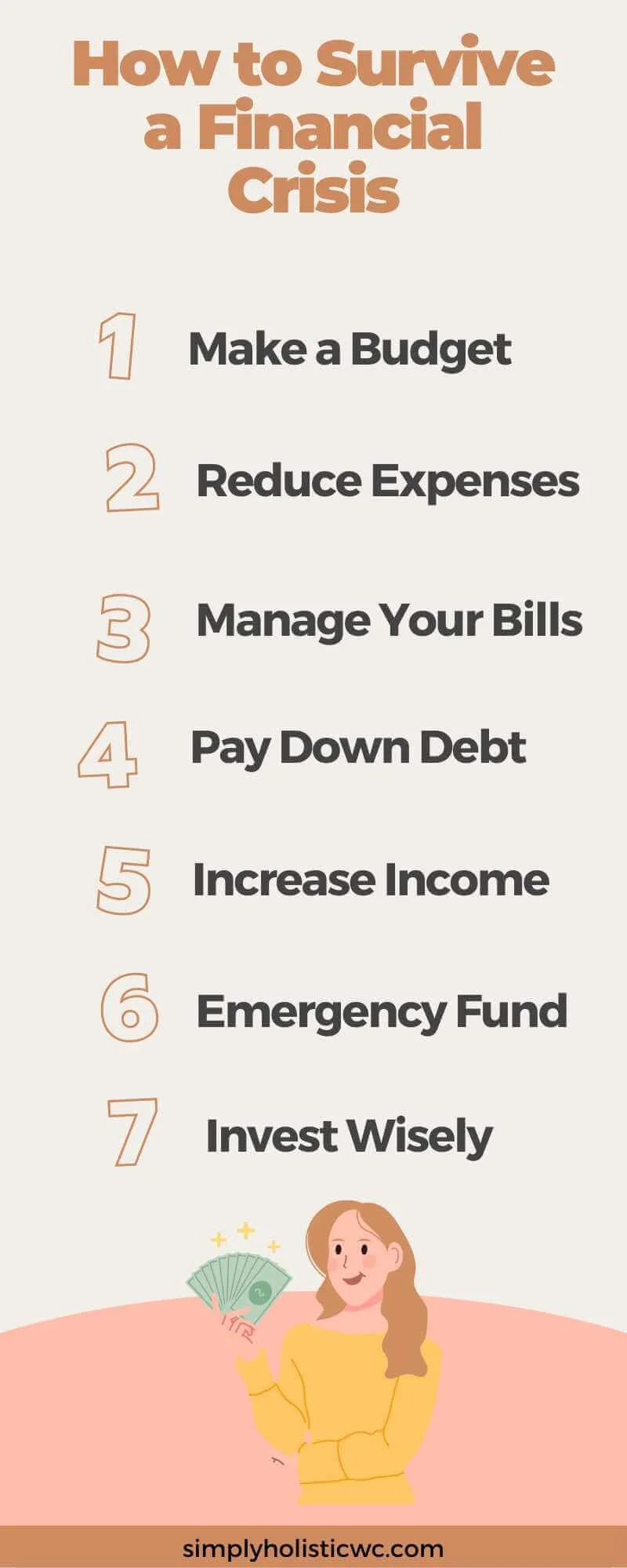7 Tips to Survive a Personal Financial Crisis
It's no secret that financial instability and uncertainty are two of the biggest challenges we face in life.
Whether you're dealing with a temporary dip in your income or needing to work out more long-term strategies to feel financially secure, it can all seem overwhelming and intimidating.
But don't worry. There are plenty of simple tips that can help make managing finances during tough times less scary and more manageable.
In this blog post, we'll walk through seven practical steps that will take away some of the stress associated with financial crisis so that you can have peace of mind as you navigate these challenging times.
This post may contain affiliate links for which I may earn a small commission. This means shopping through these links supports my blog at no cost to you. Please read my full policy. Thank you!
Understanding a Personal Financial Crisis
So, what's a personal financial crisis?
Imagine this - you've lost your job, or perhaps an unexpected expense has cropped up, and suddenly, you find yourself struggling to meet even basic financial needs.
That, my friends, is a personal financial crisis. It's a storm that can hit anyone, at any time, turning financial stability into chaos.
Here are some ways it can impact individuals and families:
Job loss or reduced income: This is often the primary trigger for a personal financial crisis. Without a steady income, managing expenses becomes a challenge.
Increased debt: You might find yourself relying more on credit cards or loans to cover expenses, leading to a pile-up of debt.
Mental stress: The constant worry about money can lead to sleepless nights and anxiety, affecting your overall well-being.
Strained relationships: Money problems can lead to tension between family members or partners, causing emotional distress.
In real-life scenarios, this could look like maxed-out credit cards after a medical emergency, or an empty bank account due to job loss during a recession.
But remember, every crisis also brings an opportunity for growth.
In the following sections, we'll explore seven tips to help you navigate through a personal financial crisis.
Tip 1: Make a Budget
Budget - sounds boring, right? But trust me, it's your financial lifeboat in times of crisis.
Creating a budget helps you understand where your money is going and how you can control it better.
Start by listing all your income sources and expenses. Be sure to include everything, no matter how small.
Prioritize your expenses. Needs come first - food, housing, utilities, etc. Wants can wait!
Review your budget regularly. Changes in income or expenses mean changes in your budget too.
You May Also Enjoy:
10 Ways Minimalism Can Save You Money
How to Survive During a Recession
How To Pay Off Debt with Low Income
7 Money Management Tips for Beginners
Tip 2: Reduce Expenses
Now, let's talk about belt-tightening. Reducing expenses isn't just about surviving the crisis; it's about building better financial habits for the future.
Identify non-essential expenses you can cut back on. Maybe it's that daily coffee run or the premium streaming service.
Consider cheaper alternatives for essential expenses. For instance, cook at home instead of eating out, or switch to a cheaper phone plan.
Remember, every little saving adds up in the long run.
Tip 3: Manage Your Bills
When money's tight, staying on top of bills can seem like climbing Everest. But with some smart strategies, it's absolutely doable.
Set reminders for due dates to avoid late fees. Use apps or good old-fashioned calendars.
Contact service providers for possible payment plans or extensions if needed.
Consolidate bills where possible. It's easier to manage one payment than many.
Tip 4: Pay Down Debt
Debt can be a real downer, especially in a financial crisis. But don't worry, there are ways to lighten the load.
Focus on high-interest debts first. They cost you more over time.
Consider debt consolidation or refinancing options for lower interest rates.
Make regular, even if small, payments. Every bit helps!
Tip 5: Increase Income
Earning more money can give you the extra cushion you need in a crisis. It's time to get creative!
Consider part-time jobs or freelancing. Use your skills to earn some extra bucks.
Explore passive income options like renting out a room or selling handmade products online.
Remember, there's no shame in side hustles. They're smart, not desperate!
Tip 6: Build an Emergency Fund
Think of an emergency fund as your financial safety net. It's there to catch you when life throws a curveball.
Start small. Save whatever you can, whenever you can.
Aim for three to six months' worth of living expenses in your emergency fund.
Keep it accessible but separate from your regular account to avoid temptations.
Tip 7: Invest Wisely
Investing during a financial crisis might seem counterintuitive, but it can be a smart move if done wisely.
Stick to investments you understand. Now's not the time for risky ventures.
Diversify your portfolio to spread the risk.
Consult with a financial advisor if possible. It's okay to seek help!
Remember, surviving a financial crisis takes patience, discipline, and resilience.
But with these tips, you'll not just survive, but come out stronger on the other side.
↓PIN IT FOR LATER!↓
Conclusion
And there you have it - Seven practical tips to help you navigate through a personal financial crisis.
Everyone's financial situation is unique, so tailor these strategies to fit your needs.
It's all about taking control of your finances, one step at a time.
Whether it's creating a budget or investing wisely, each action you take brings you closer to financial stability.
Remember, the goal isn't just to survive a financial crisis but to emerge from it stronger and more financially savvy.
So, don't be disheartened by the challenges ahead. You've got this!
Stay resilient, stay informed, and keep pushing forward. Here's to your financial wellness!

